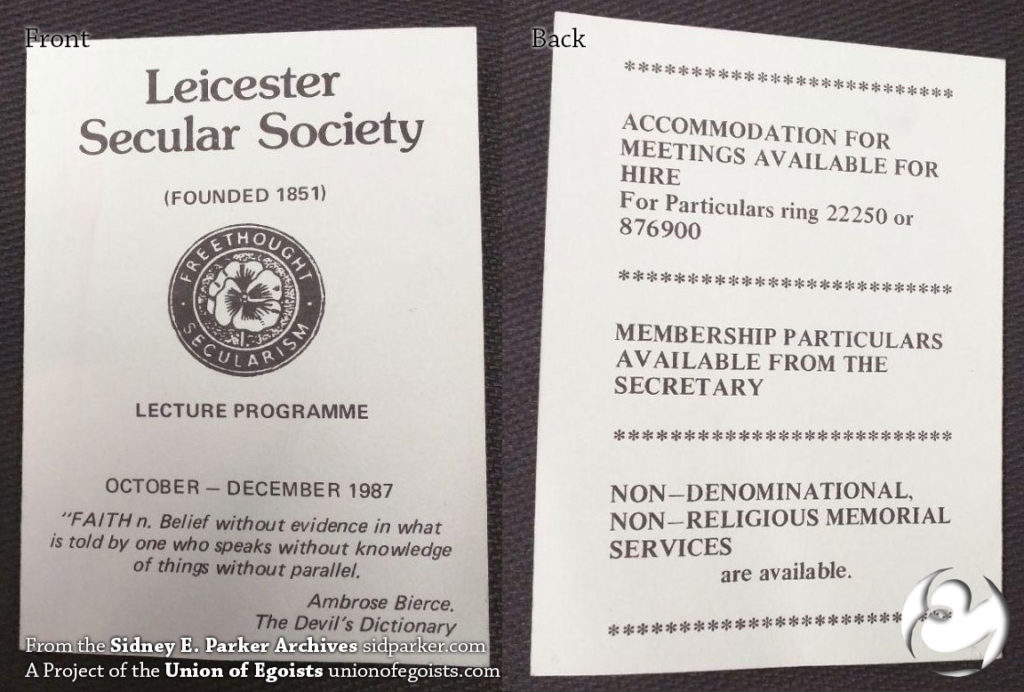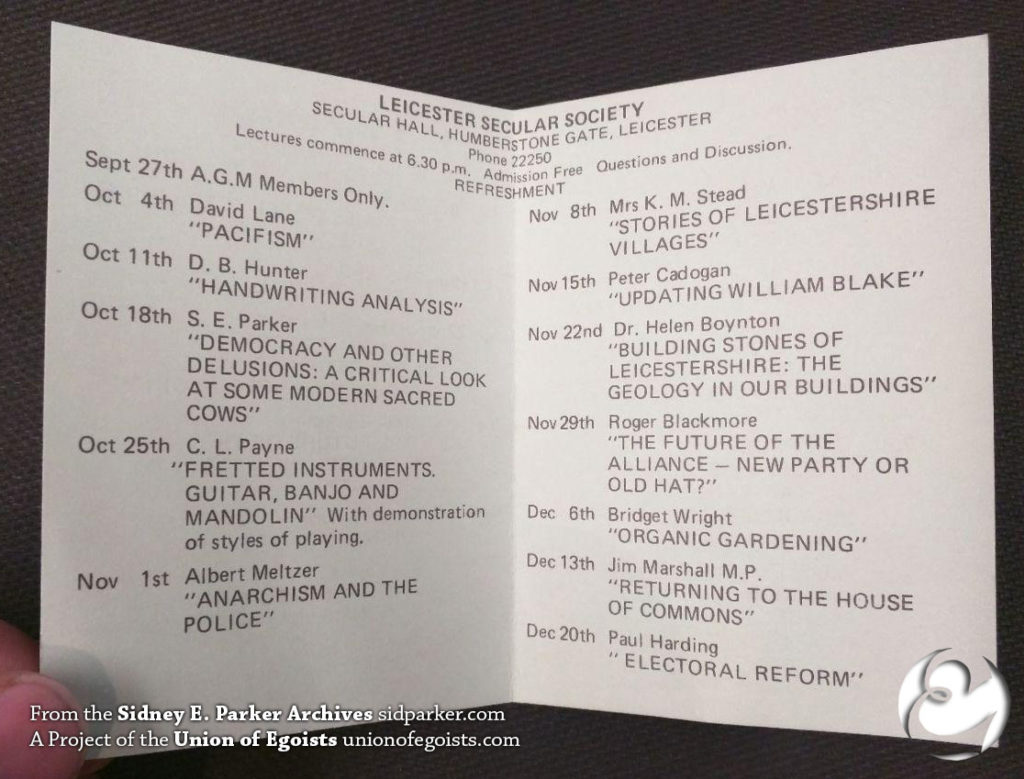The Libertarian Microfiche Project is an important source of material for this project and the parent Union Of Egoists project. Many items assumed lost were found there, and what is below is the fill index of S.E. Parker material indexed by John Zube that can be found in his microfiche.
No individual or institution in Europe or America has a full set of this microfiche and we are trying to raise funds to procure one. Please find out more here.
From “P-Q“
PARKER, S.E., Ego & Society, 6pp, in PP 1423: 26.
PARKER, S.E., Einfuehrung zu Badcock, Sklaven der Pflicht, 5 S., 24x, in PP 283-285.
PARKER, S.E., Enemies of Society, 1967, 4pp, in PP 1420/22: 267.
PARKER, S.E., In Defence of Social Pessimism, 2pp, in PP 1420/22: 67.
PARKER, S.E., In Defence of Social Pessimism, 2pp: 59, in PP 1465, in reply to Francis Ellingham.
PARKER, S.E., Individualism and the FREEDOM ASSOCIATION, 2pp, in PP 1420/22: 499.
PARKER, S.E., Individualism, Anarchism & the Police, 2pp, in PP 1420/22: 71.
PARKER, S.E., Individualist Anarchism, an outline, 4pp, 1965, 29x, in PP 386. – 2pp, in PP 1420/22: 34 & 46.
PARKER, S.E., Individualist-Anarchism, 2pp, in PP 1420/22: 11.
PARKER, S.E., Individualistischer Anarchismus, 3pp, 24x in PP 281.
PARKER, S.E., Introduction and note to Ragnar Redbeard, 7pp, in PP 1113.
PARKER, S.E., Introduction to Badcock’s Slaves to Duty, 4pp, in PP 897. With notes by James J. Martin.
PARKER, S.E., Introduction to E. ARMAND, 3pp: 188, in PP 501.
PARKER, S.E., Letter from the editor of EGO, with Jim Stumm’s reply on egoism, 1p, in PP 1318/1319: 190.
PARKER, S.E., Libertarian Broadsides & Individualist Sorties, 4pp, in PP 1420/22: 321.
PARKER, S.E., More Attacks on St. Max, 2pp, in PP 1420/22: 341.
PARKER, S.E., Nietzsche – Antichrist? 4pp, in PP 1423: 10.
PARKER, S.E., On Revisiting “Saint Max”, 4pp, in PP 1423: 29.
PARKER, S.E., Ragnar Redbeard and the Right of Might, 5pp: 16, in PP 1505. – Ibid : A Note on Ragnar Redbeard (Arthur Desmond): 14.
PARKER, S.E., Review of AVRICH, PAUL, Voltairine de Cleyre, 2pp, in PP 1420/22: 493.
PARKER, S.E., Review of: BOETIE, ETIENNE DE LA, Discours de la Servitude Voluntaire, in English & French, Ralph Myles edition, 2pp, in PP 1420/22: 411.
PARKER, S.E., Review of: DETTMEYER, DIEDERICK, Max Stirner: Etudes, documentes reunis and presentees, 1p, in PP 1420/22: 505.
PARKER, S.E., Review of: HOPKINS, BILL, The Leap, 1p on the book by what P. calls an inconsistent individualist, in PP 1423: 34.
PARKER, S.E., Review of: LABADIE, LAURENCE, Selected Essays, introduced and with appendices by James J. Martin: 1p, in PP 1420/22: 507.
PARKER, S.E., Review of: MARTIN, JAMES J., Men Against the State, 1p, in PP 1420/22: 123.
PARKER, S.E., Review of: RILEY, THOMAS A., Germany’s Poet-Anarchist: John Henry Mackay, 4pp, in PP 1420/22: 366.
PARKER, S.E., Review of: ROBINSON, JEFF, Anarchism & Modern Society, a pamphlet published by Parker, 1p: 47, in PP 1465.
PARKER, S.E., Review of: ROBINSON, JEFF, The Unavoidable Crisis, pamphlet, in PP 1420/22: 129.
PARKER, S.E., Review of: SARGENT, LYMAN TOWER, Contemporary Political Ideologies, 1p, in PP 1420/22: 103.
PARKER, S.E., Review of: SOLNEMAN, K.H.Z., John Henry Mackay – the Unique, 1p, in PP 1420/22: 494.
PARKER, S.E., Reviews, of SPOONER, LYSANDER, Vices are not Crimes & of MARTIN, JAMES J., The Saga of Hog Island & Other Essays in Inconvenient History, 2pp, in PP 1420/22: 480.
PARKER, S.E., Revolution, Individualism & Stephen Halbrook, 3pp, in PP 1420/22: 107.
PARKER, S.E., Sociolatry, 1p., in PP 1312/1314.
PARKER, S.E., Some Notes on Anarchism & the Proletarian Myth, 2pp from THE MATCH, in PP 274: 148.
PARKER, S.E., Some Notes on Anarchism and the Proletarian Myth, 1973, 2pp, 29x, in PP 484. (I seek a full set of his MINUS ONE for filming. J.Z.)
PARKER, S.E., Some Notes on Anarchism and the Proletarian Myth, 2pp, in PP 274.
PARKER, S.E., Some Slings and Arrows, 2pp: 37, in PP 1465.
PARKER, S.E., St. Max & the Critics, 2pp, in PP 1420/22: 130.
PARKER, S.E., Stirner on Education, 2pp, in PP 1420/22: 299.
PARKER, S.E., Stirner, Marx & Fascism, 3pp, in PP 1420/22: 509.
PARKER, S.E., The Morality of Co-Operation, 2pp, in PP 1420/22: 205. – There are almost endless varieties of cooperation. Too many anarchists tend to discuss only the pro and con of the senseless ones. – J.Z.
PARKER, S.E., The Myth of Morality, 6pp, in PP 1423: 53.
PARKER, S.E., The Poet and the Bogeyman: Or, the Case of Holbrook vs. Stirner, 3pp, in PP 1420/22: 465 & 472.
PARKER, S.E., Three European Anarchist Individualists, Some Notes on Armand, Martucci & Novatore, 3pp: 90, in PP 501.
PARKER, S.E., to Michael E. Coughlin, 2pp, Summer 78, 29x, in PP 243.
PARKER, S.E., Two Egoists: WILLIAM J. BOYER, 1904-1988 & STEPHEN MARLETTA, 1907 – 1989, 4pp, in PP 1423: 51.
PARKER, S.E., Untitled, 2 pages comment on Sargent’s review of Goldwater & Buckley, in PP 1420/22: 198.
PARKER, S.E., Victor Serge and Ego Anarchism, 2pp, in PP 1420/22 : 116.
PARKER, S.E.,Malfew Seklew – the Jester Philosopher of Egoism, 2pp, in PP 1420/22: 385.
PARKER, S.E., Archists, Anarchists and Egoists, 3pp, in PP 1618: 34.
PARKER, S.E., Comment to Ken Knudson, 2pp, in PP 1618: 83.
PARKER, S.E., Malfew Seklew – The Jester Philosopher of Egoism, 2pp, in PP 1610: 57.
PARKER, S.E., Minus One, 2pp, in PP 1610: 41 & 44.
PARKER, S.E., On Revisiting “Saint Max”, 2pp, in PP 1618: 65.
PARKER, S.E., Preface, 1p, in PP 1618: 68. On Stirner & other egoists. – Note that NON SERVIAM Nos. 13 & 14 do together contain the last issue of Sid Parker’s EGO, whose part is now taken over by NON SERVIAM.
PARKER, S. E., See: LEFEVRE, ROBERT, Morality vs. Egoism, and exchange between Robert LeFevre and S.E. Parker in MINUS ONE, issues 20 & 21, dated Oct-Dec. 1967, 4pp, in PP 1680: 150, from the archives of THE MEMORY HOLE. – MINUS ONE has been fiched by LMP, either completely or nearly so, in several batches, as they became available. – J.Z.
PARKER, S.E., Sociolatry, 1p: 16, in PP 1564.
PARKER, S.E., Some Reflections, 2pp, in PP 1610: 50. – Unsigned, but, I suppose, by him. – J.Z.
PARKER, S.E., The Egoism of Max Stirner, 2pp, in PP 1618: 53.
PARKER, S.E., Three comments on your article “The Union of Egoists” which appeared in NON SERVIAM, 1p, in PP 1618: 97.
PARKER, S.E., to LABADIE, LAURANCE & ROSEMAN, HERBERT, n.d., 2pp, (47), in PP 1723/24: 290.
PARKER, S.E., to LABADIE, LAURANCE, June 20, 1962, 1p, in PP 1723/24: 376.
PARKER, S.E., to LABADIE, LAURANCE, May 16, 1962, 1/2p, in PP 1723/24: 375.
PARKER, S.E., Wm. Flygare (1916-1997), paragraph, biographical, in PP 1618: 98.
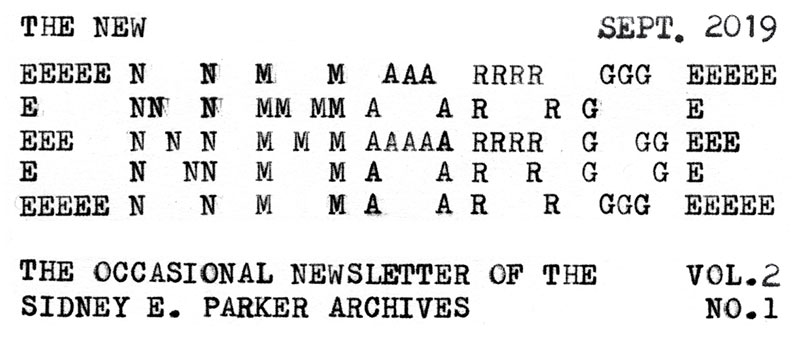

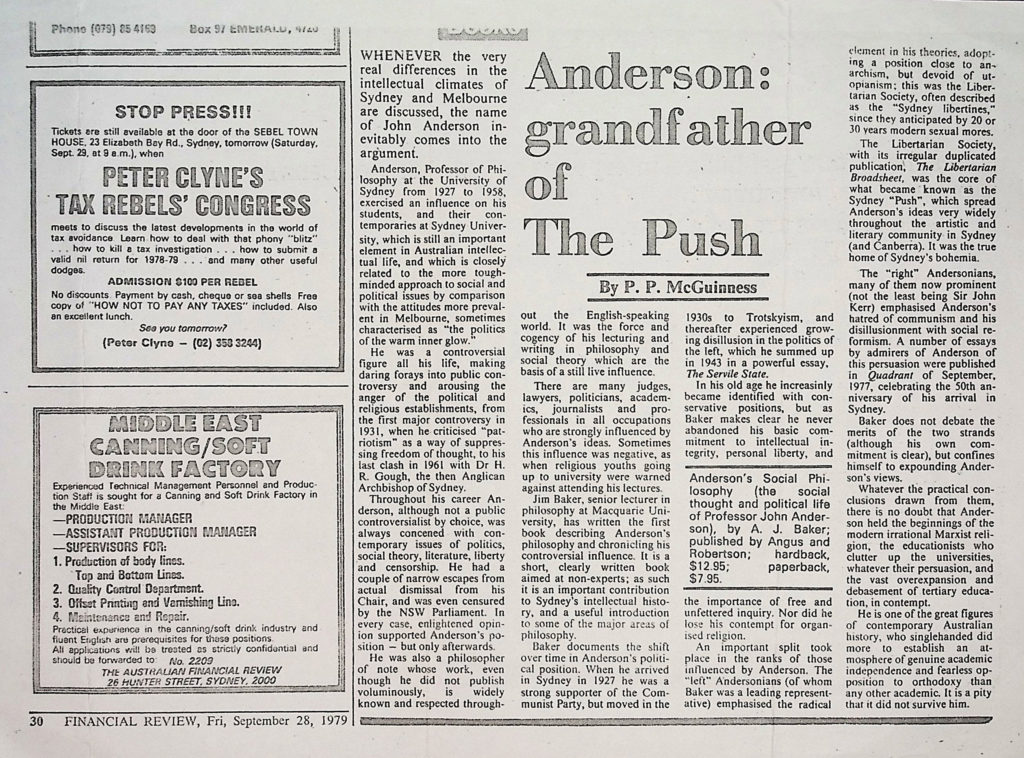
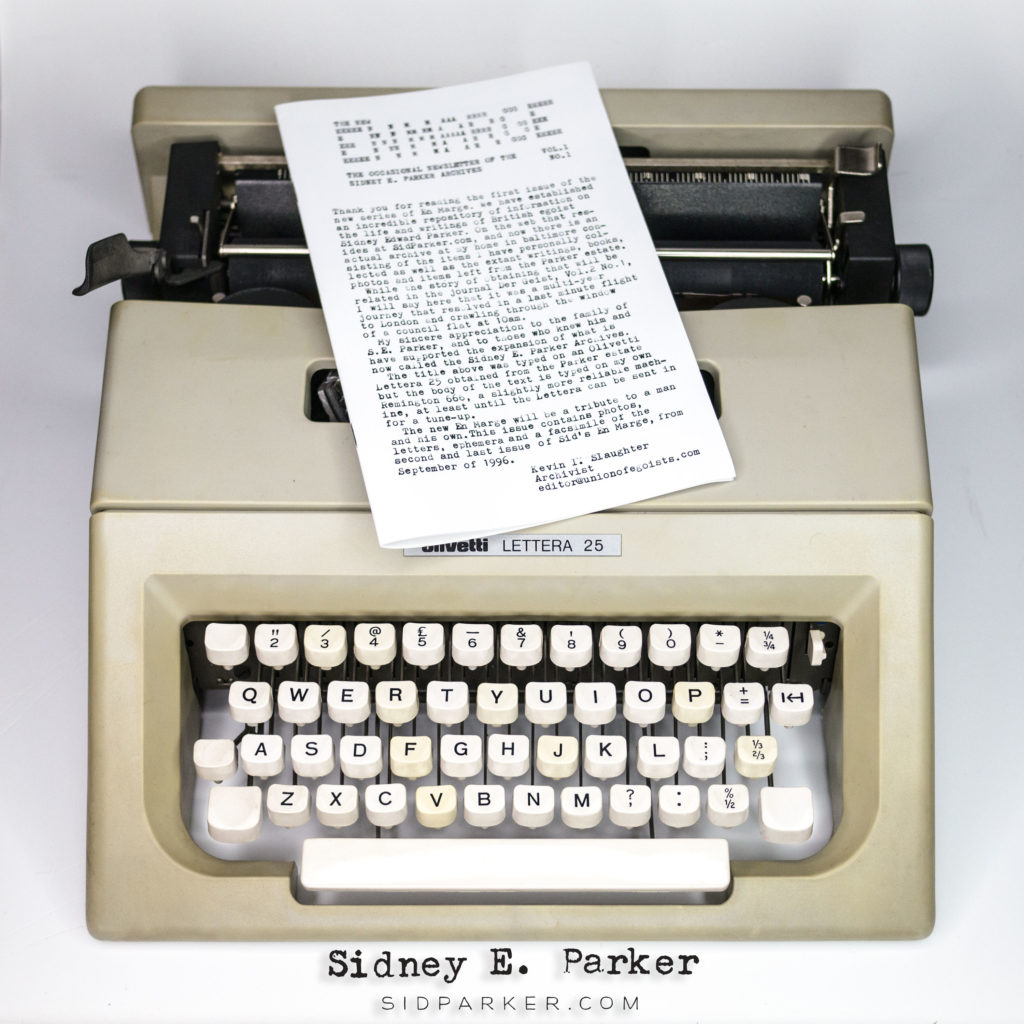
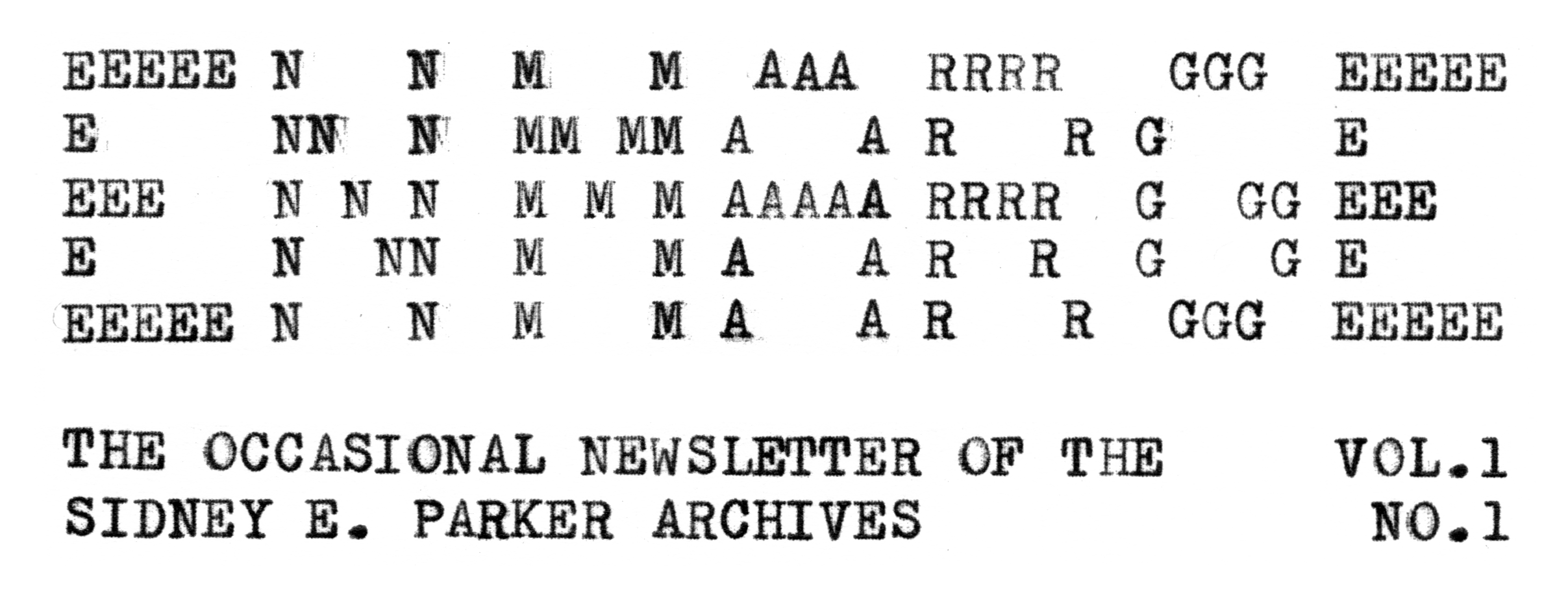
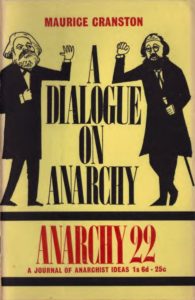 The following essay by Donald Rooum is a review of
The following essay by Donald Rooum is a review of 